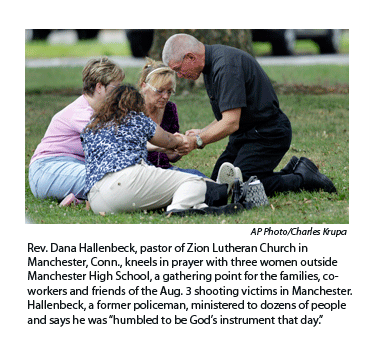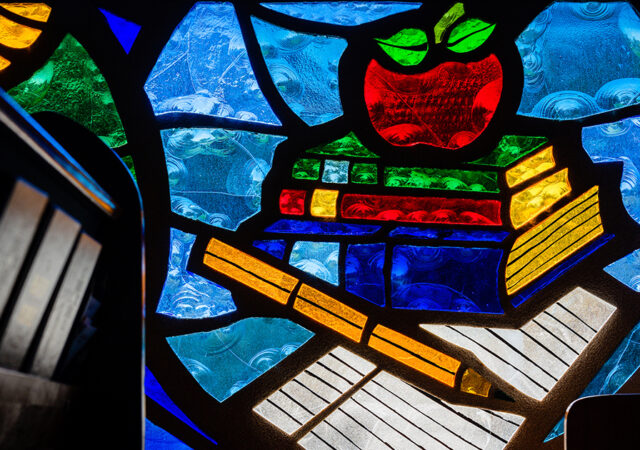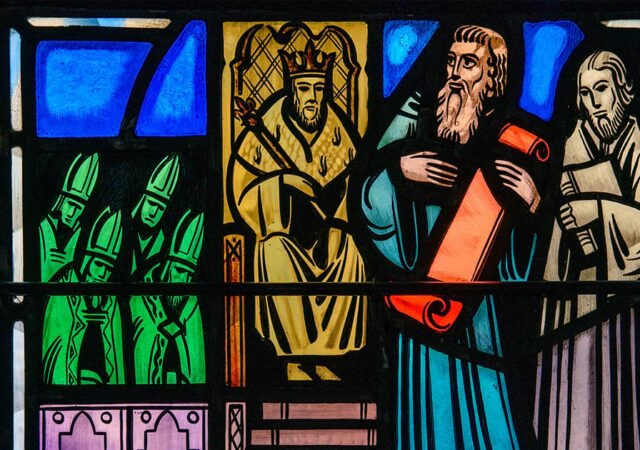By Paula Schlueter Ross
The photo is striking. A minister kneels on the ground, clutching the hands of three women as he leads them in prayer after a shooting Aug. 3 in Manchester, Conn.
Rev. Dana Hallenbeck, the minister in the photo, finds it “amazing” and “very humbling” that the photo accompanied so many news reports about th e shooting that took nine lives.
e shooting that took nine lives.
“Of all the pictures taken by a secular media that day of all the horror and grief, the simple picture of a clergyman kneeling in prayer with several women seemed to define the event,” said Hallenbeck, still a little surprised. “It was a picture of God’s grace and peace, borne in a jar of clay, bringing comfort to His people, that caught the attention of the national news media.”
Hallenbeck is pastor of Zion Lutheran Church, “the greatest little church in Manchester,” according to the church’s answering machine. He was getting ready for work when his daughter called about 8 a.m. to tell him about the shooting. Her husband, a Manchester policeman, had been called back to work, along with the rest of the force, and she knew her dad might pass the area on his way to the church.
The details, which emerged later, are this: A local beer distributorship employee, Omar Thornton, had been asked to resign. Instead, Thornton opened fire with a .223-caliber semiautomatic rifle, killing eight people before turning the gun on himself.
Hallenbeck, 59, had spent 18 years as a police officer in West Hartford, Conn., then another 15 as the town’s director of Public Works, before hearing God’s call to the ministry. He graduated from the Distance Education Leading To Ordination (DELTO) program at Concordia Seminary, St. Louis, just last year.
When he learned about the events across town, Hallenbeck, who also serves as a police chaplain, drove to the police headquarters to see if they needed him. He was the first chaplain to arrive, and was asked to help counsel victims’ families and survivors, who were being bused from the shooting site to a high school a few blocks away.
Minutes later, the pastor and another chaplain drove over to the school.
“As the buses pulled up, I prayed with the other chaplain, asking God for courage, strength, wisdom and the ability to make His presence known and felt,” Hallenbeck said.
In all, more than 300 people gathered at the high school. Some were happy to be alive and reunited with their loved ones, the pastor said. Others were in shock, distraught, frightened or angry.
Hallenbeck started with those “in obvious grief” and moved from person to person, asking them who they were, how they were doing and offering to pray.
Other chaplains arrived. He saw one try to embrace a hurting family, announcing “Come, let us pray for God’s presence and healing,” and was shocked when family members cursed at the chaplain, saying they wanted answers about their father’s condition, not prayers.
Seeing that, Hallenbeck said, brought to mind a book, Don’t Sing Songs to a Heavy Heart, that warns well-meaning pastors about saying the wrong thing to people in crisis situations. So, in an effort to avoid making the same mistake, he “prayed” the book’s title as he approached others.
In the Associated Press photo that accompanies this story, the woman facing the camera had just learned that her brother had been killed and she “had walked off by herself and collapsed on the ground,” Hallenbeck recalled.
“By the time I got to her, she had been joined by two employees of the Teamsters Union, who were there to support the workers and their families,” he said.
They talked, and when Hallenbeck offered to pray for the woman and her family, “she said ‘please,’ and we all joined hands and I prayed,” he said.
Hallenbeck guesses he talked with as many as 60 people that day. The conversations “often, but not always, led to a brief prayer,” he said.
“In all, we spent about six hours ministering to people in different emotional states,” he told Reporter. “We were released [by the police department] at around 3:30 p.m. It was a long and physically, emotionally and spiritually draining day.”
Hallenbeck believes his career path — from policeman, to Public Works director, to pastor — was directed by God.
“God has prepared me in a special way, for a special place, for a special time,” he said. “This event just reinforced that for me.
“If it weren’t for the DELTO program, my church would not have a pastor and I would not have been available to respond to that horrible event that day.”
His earlier careers, he said, “did prepare me to minister to those people that day. In those previous careers, part of my job was to arrive at scenes of chaos and disaster and attempt to restore calm and order by bringing the presence and authority of the ‘state.’ Here, I was attempting to bring peace, calm and order to this scene by bringing the presence of God and His authority.
“I was humbled to be God’s instrument that day.”
One of the memories Hallenbeck says he’ll treasure involved a family who learned that a loved one had died in the shooting.
“As the family left crying, they were being supported by one family member who remained resolute and strong,” the pastor recalled. “He was the last to leave. As he walked past me I hugged him, gave him a kiss on the cheek, and whispered, ‘I love you.’
“He pulled back and, still holding on to me, said, ‘Of all the things I needed today, that’s what I needed the most.'”
Says Hallenbeck: “We all need God’s love. And we need to share that love — especially when people are hurting.”
Posted Aug. 25, 2010




